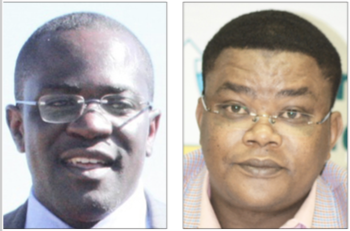By Ndanki Kahiurika| 10 August 2016
THE government is trapped in an open-ended contract for the rehabilitation of the Kransberg-Tsumeb railway line, paying about N$200 million a year to D&M Rail Construction.
TransNamib hand-picked D&M Rail Construction without advertising the tender, and signed the contract in 2014.
Contracts without an exit clause, especially when committing public funds indefinitely, are generally considered dubious, or are the result of shoddy work.
The works ministry’s spokesperson Julius Ngweda said governement has to date spent N$300 million on the Kranzberg-Tsumeb railway since 2013, with an additional N$80 million per year on sleepers. This brings the amount to approximately N$500 million.
A sleeper is a rectangular brick brace which supports the railway line.
But the TransNamib contract seems more concerning as it bypassed public bidding for rail repair jobs, thus denying government the option to test the market for better service, quality and price.
People familiar with the works ministry’s top management meetings said government officials concerned about the open-ended contract asked attorney general (AG) Sacky Shanghala about the possibility of getting out of the contract.
Shanghala, it is understood, advised that it was complicated to simply cancel the contract.
D&M Rail Construction is owned by Shanghala’s friend and business partner, James Hatuikulipi.
They are partners in several entities, including Hanganeni Investment Holdings, the company which owns the Emona student hostels at the University of Namibia’s main campus in Windhoek.
The AG is said to have told the ministry that the agreement was valid, and that a clause stipulating when the contract might end is not reason enough to cancel it.
“It is further advisable that caution be taken in seeking to terminate without due justification, as such would necessarily attract sanction from our courts,” Shanghala said in one of the documents The Namibian saw.
The Namibian two weeks ago reported that the works ministry queried the validity of the contract, and was trying to find ways to end it because D&M Rail Construction had not been performing as expected.
Ngweda said they are still to decide on the way forward, following the advice from Shanghala.
“There has been slow progress from the company [D&M], and no definite work was being done. We wanted to explore other options, and because of that, we thought it would be better to get a legal opinion [about the contract from the AG] on how to go about it.
We wanted to give [the rail repair work] to different companies to speed up the rehabilitation so as to meet the 2020 deadline, and to give an opportunity to many companies so that they can gain experience in the railway business.
Lastly, it was for the quality, price and monopoly issues. To date, 120 kilometres has been partially upgraded; that is, new sleepers and ballast have been applied. No new rails were laid because these are still to be purchased,” explained Ngweda.
TransNamib’s acting chief executive Hippy Tjivikua defended the contract, saying D&M Rail Construction was the only suitable company in the country to do the work.
“We do not want to compromise any safety. I would be very happy if you can tell me that there is another Namibian company which does similar work like this one,” he stated.
When The Namibian began querying the contract three weeks ago, Tjivikua hastily arranged for a meeting involving several parties in order to explain it to the paper.
The meeting was held on 18 July 2016 in the works ministry’s boardroom, where the only representative from works was senior mechanical engineer Justice Ncube, who acted as an observer.
In attendance were representatives from Windhoek Consulting Engineers (WCE), being transport division director Victor Rieger; Jack Dempsey (WCE); Koos Steyn (WCE); D&M Rail Construction chief executive Dawie Moller; and D&M Rail Construction co-owner Hatuikulipi. WCE was appointed by the works ministry in 2010 to carry out supervision on the work done by D&M Rail Construction.
They have so far defended the contract and the construction company in various matters, including a separate tender for the supply of ballast.
At that meeting, Tjivikua disputed claims that D&M Rail Construction’s work was not up to standard.
Moller said if there was any unhappiness, it was not communicated to them.
“Just tell me, who can work in this industry without certainty of payment?” Moller asked.
TransNamib and D&M Rail Construction formed Namibia Rail Construction in 2014, in which TransNamib holds 51% ownership, while D&M Rail Construction owns 49%.
Rieger told The Namibian at the same meeting that D&M Rail Construction has only been doing emergency repairs since 2012, and has not yet started on the rehabilitation of the railway.
This is despite a report by The Namibian in 2013, which quoted D&M Rail Construction site agent Leon Steyn as saying that they had began rehabilitation on the railway earlier the same year.
Rieger also said the agreement did not include a time frame in which it should end because the ministry was not sure whether they would have enough money for the project in each year’s budget.
Hatuikulipi said they pushed for the exclusive deal because they wanted certainty.
“As a contractor, we also want certainty. If the funding was available, then the timing of the contract would have been clear. Two weeks ago, we sat with the ministry, and were told to slow down, that means cutting off some employees. It is also frustrating for us,” said Hatuikulipi.
Meanwhile, D&M Rail Construction provoked controversy about deals with TransNamib in 2012 when the works ministry transferred money to TransNamib at midnight for the company [D&M] to get the rail repair contract.
This was done through bypassing tender requirements at the time that the current secretary to Cabinet, George Simataa, was permanent secretary at the works ministry.






